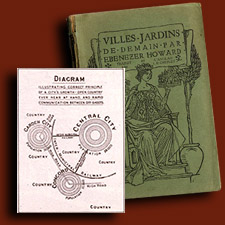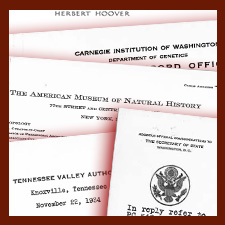

Nazism remains an enigma. Historians do not know whether to slot Nazism as a phenomenon of the political “right” or “left,” largely because of a misunderstanding of how central eugenics was to the regime. Eugenics, or “racial hygiene,” was at the core of National Socialism’s domestic policy, foreign policy, culture wars, and even Hitler’s obsession with cars, highways, and city planning. Thus, no coherent understanding of the regime is possible without first grasping the nature of eugenics.
This book traces the origins of the Nazi eugenics state, from its beginnings in British and American Academia, uncovering previously unpublished manuscripts, professional correspondence, and conveniently forgotten publications.
● Buy on Amazon ● Buy on Google Play ● Buy on Barnes & Noble ●PRIMARY SOURCES –
ARCHIVAL COLLECTIONS:
There has been a lot of conjecture written about the eugenics movement, its political affiliations, and its intentions despite the hard evidence left behind by the masterminds and kingpins of the movement in the form of personal and official correspondence. That is where speculation ends, and the truth begins. The personal papers of the American eugenics movement can be found in these archives. Researchers will find that even if one perpetrator destroyed their correspondence, there are copies in the collections of those either in the sending or receiving end of the back-and-forth that spanned educational institutions, professional organizations, nations, and continents. Even seemingly inconsequential musings, scribbles, and newspaper clippings help paint a picture of the mindset of the eugenicist against which all other speculation about the movement must be weighed.
- Truman State University, MO - Pickler Memorial Library – Manuscript Collections – Special Collections – Harry Hamilton Laughlin. – Aside from being Davenport’s protégé, Laughlin functioned as the clearinghouse for the international eugenics movement. His papers are seldom, if ever, visited goldmine of correspondence between the American, German, British, and Scandinavian eugenic leadership.
- American Philosophical Society, PA – Genetics and Eugenics Collection. – This archive holds the American Eugenics Society records and correspondence.
- California Institute of Technology, CA – Archives - Register of the E. S. Gosney Papers and Records of The Human Betterment Foundation, 1880-1945. – E.S. Gosney’s foundation was second only to Cold Spring Harbor and the Kaiser-Wilhelm Institute in importance as a hub of eugenic research.
- Image Archive on the American Eugenics Movement, DNA Learning Center, Cold Spring Harbor Laboratory, Cold Spring Harbor, NY. – Sourced through: dnalc.org – eugenicsarchive.org.
- Cold Spring Harbor Laboratory Library, Cold Spring Harbor, NY. – The archival section holds Charles B. Davenport’s book and journal collection. The contents of this collection are telling by itself.
- Carnegie Institution of Washington, D.C. - Eugenics Records Office Files – Archived Records. – I was told by the archivist that I was one of very few, if not the only one, to ever request these files. However, Prof. Garland Allen, later informed me that he did scour through this collection. This collection is key in understanding the various projects entrusted to Cold Spring Harbor by the famous institution, as well as how the famous heads of the institution, namely Vannevar Bush interacted with figures such as Laughlin and Davenport.
- Columbia University, NY – Rare Book & Manuscripts, Butler Library -Telford Taylor Papers. – Taylor was a pivotal figure for the American prosecution during the Nuremberg Trials. His papers are indispensable.
- United States National Archives, Washington D.C. – The Military & Military Engagements / WWII (1941-1945) / Records About the Holocaust and War Crimes.
- University of Iowa – Libraries, Special Collections & Publications - Charles F. Wennerstrum Papers. – Justice Wennerstrum was one of the judges to preside over the Nuremberg Trials. His perspective is of interest as he felt strongly that the format and rules of the Trials betrayed American jurisprudence.
- United States Library of Congress, Washington D.C. – Manuscript Division – Robert H. Jackson Papers. – Justice Jackson served as Chief Prosecutor for the American legal team at Nuremberg.
- The Margaret Sanger Papers Project, nyu.edu.
- Chicago Tribune Archives, chicagotribune.newspapers.com - The Chicago Tribune seemed to cover the inner workings of Hitler’s Germany with clarity and thoroughness that is present in no other media of the era.
- New York Times Article Archive, archive.nytimes.com.
PERSONAL CONVERSATIONS
AS PRIMARY SOURCES:
A single conversation can forever change your perspective. There are several scholars and friends who provided encouragement and a vital perspective necessary to mature this book into its final form. Two of these individuals are worth special mention:
- Ken Gemes of Birkbeck University of London is a recognized expert on Nietzsche. Nietzsche cannot be avoided if one wants to write a thorough history of eugenics leading up to The Holocaust. Professor Gemes was generous enough to sit down with me on several occasions and converse about Nietzsche.
- Garland Allen of Washington University of St. Louis is one of the first academics to take on the American eugenics movement. His papers remain the most formidable sources of information on the subject. He is now retired but was kind enough to provide me with much valued guidance.
- Jonathan Marks from the University of North Carolina was kind enough to answer my questions on the “ape-human” issue of evolutionary biology.
- Paul Lombardo is a Regents’ Professor and Bobby Lee Cook Professor of Law in the Center for Law Health and Society at Georgia State University. He has continually provided clarity on the issue of eugenics cases before the U.S Supreme Court, namely Buck v. Bell.
- Stefan Kühl is a Professor of Sociology at the Faculty of Sociology of the University of Bielefeld. He has on many occasions been kind enough to answer questions and provided direction.
Concepts Explored

Eugenic Utopianism
Contrary to popular belief, eugenics was not considered "pseudo-science" in the first half of the 20th Century. Eugenics was very much so considered a respectable science and a key tool in fixing all of societies ills. Authors of international repute, namely H.G. Wells, dedicated a significant amount of ink to portraying how these eugenic utopias would solve all of humanity's problems.

Funding & Support
The international eugenics movement originated in the American Ivy Leagues and their European counterparts. The science of eugenics was respected enough that it attracted the support and funding of major organizations and both the State and Federal governments in the USA.

Scientific Racism
"Racialim," the Anthropological precursor to what evolved into Scientific Racism, was considered a legitimate methodology for interpreting human history. These scientific premises evolved into the international scientific movement, a cohesive unit made up of well-respected scientists, politicians, and industrialists that operated like any other field of science, including the publication of its own journals.

Nazi Implementation
Adolf Hitler was an avid consumer of utopian movements. Hitler's publisher introduced him to the German wing of eugenics. Hitler's complete consolidation of power translated into the first proving grounds for all the aspirations of the eugenicists. These utopian visions simply would not have been allowed in nations where functioning deliberative legislatures still represented the will of the people.
Volume #1 of the Eugenics Anthology


Eugenics did not originate with Nazi Germany. It was the culmination of a worldwide movement that was widely accepted by the global scientific and academic community. This book traces the origins of the Nazi eugenics state. We investigate this 100-year trajectory from its beginnings in British and American Academia, delving into the conveniently forgotten inner-workings of a scientific era, uncovering previously unpublished manuscripts, professional correspondence, and conveniently forgotten publications. With the centenary of The Holocaust looming, uprooting the web of professional connections that engendered this movement is in order.
This book traces the origins of the Nazi eugenics state, from its beginnings in British and American Academia, uncovering previously unpublished manuscripts, professional correspondence, and conveniently forgotten publications. With the centenary of The Holocaust looming, uprooting the web of professional connections that engendered this movement is in order. The seeds of Holocaust denial take root and prosper with misinformation. Clarity and transparency are imperative, as they leave no room for denial theories that would deprive the victims of justice, or rob the living of a future.
● Buy on Amazon ● Buy on Google Play ● Buy on Barnes & Noble ●